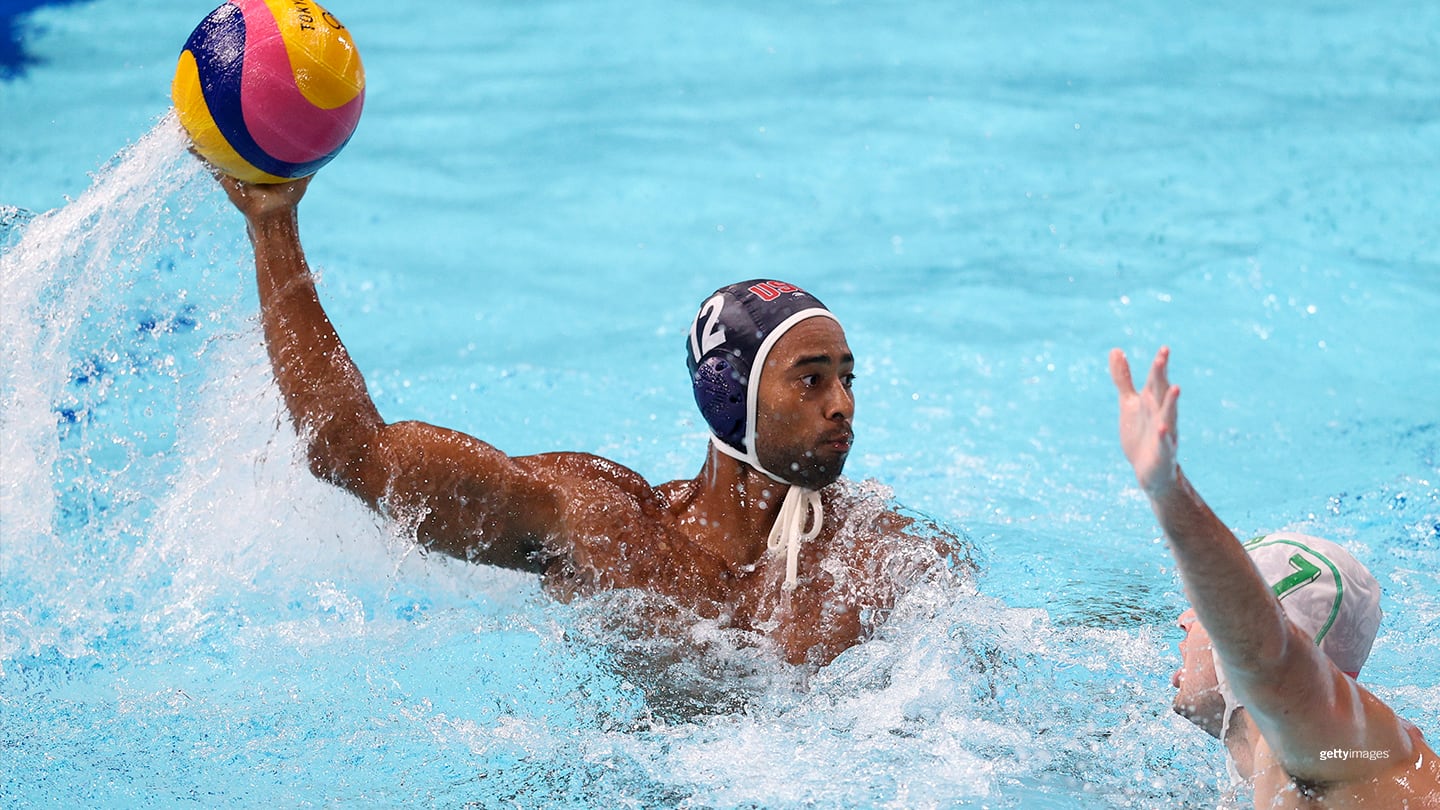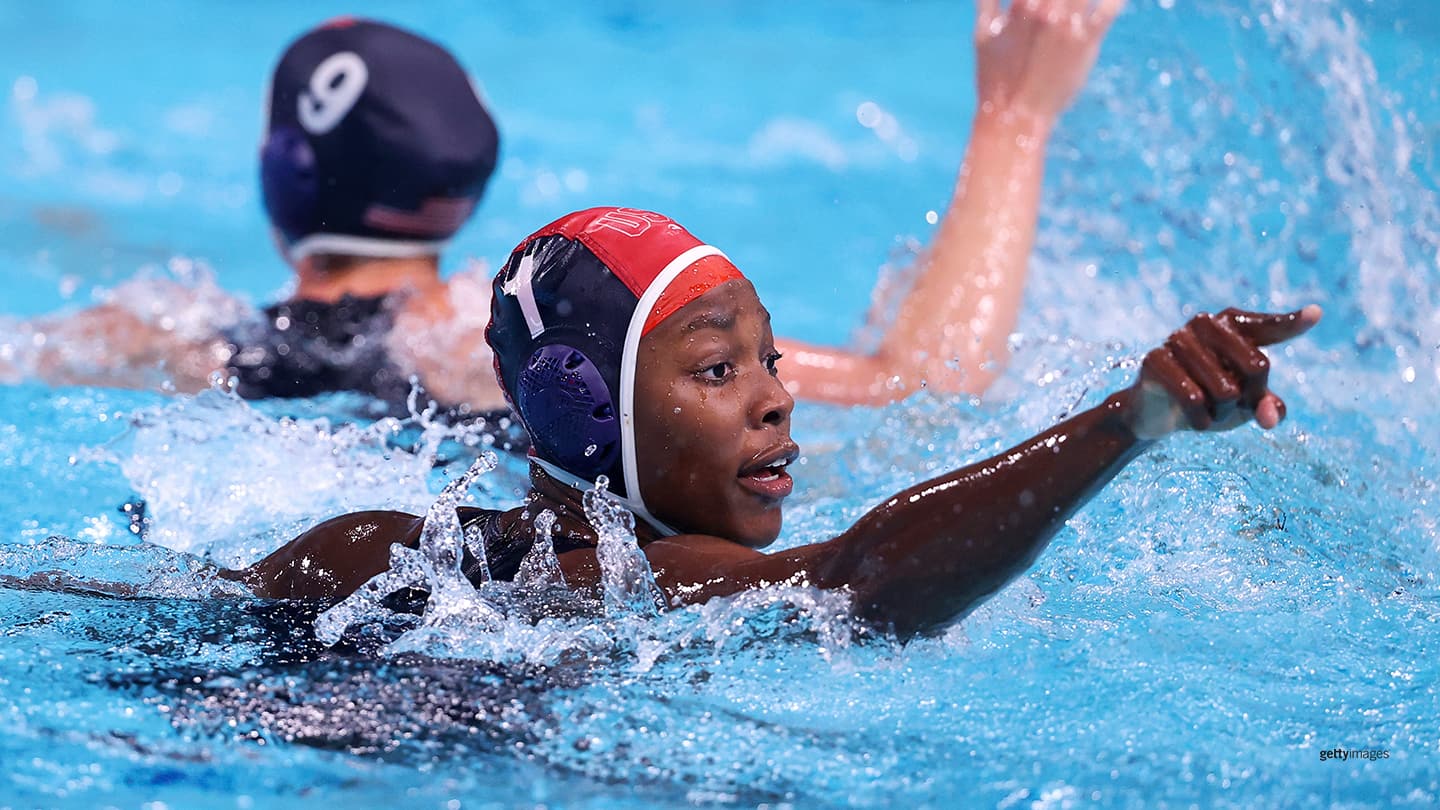Water Polo’s Max Irving And Ashleigh Johnson On What Black History Month Means To Them
by Lisa Costantini

Max Irving competes during the men's classification match against Team Italy at the Olympic Games Tokyo 2020 on Aug. 6, 2021 in Tokyo.
For Max Irving and Ashleigh Johnson — Team USA’s only two black water polo athletes — Black History Month is about sharing their stories, as well as reflecting on those who came before them.
“Reflection for how far we’ve come as a group of people, both within the U.S. and within the greater black community,” Irving shared. His hope during Black History Month is that “we can all look around, open up conversations and really take advantage of Black History Month and be inspired and try to inspire others. I think that’s something that’s really important.”
His teammate Johnson is someone who has been an inspiration to him — just as he knows he is to others.
Johnson became the first African American woman to make a U.S. Olympic women's water polo team in 2016 where she plays the challenging position of goalkeeper.
“I hope me being here encourages, at the very least, one person to try something new — challenge them to learn a new sport or break a narrative that they have in their head and push past a limit of theirs or that society has put on them,” Johnson said.
Those limitations almost stopped Irving from doing what he loves when he was around 10 years old. Three years after he learned to swim, he started hearing whispers of stereotypes like, “black people can’t swim,” and “black people don’t belong in the water”.
Initially, his reaction he said was to reject what he heard. But ultimately, he decided to prove them wrong.
“If I don’t belong in the water, I’m going to show them that I belong. So, for the next kid who might hear, hey, black people can’t swim and black people aren’t really supposed to be playing aquatic sports, not only can they have that self-belief, but they can also think, okay, we have Ashleigh Johnson, we have Maxwell Irving,” he shared.
Johnson’s fear is that hearing those stereotypes before someone even tries to swim might lead them to believe it as true.
The two teammates admit they were lucky to have the support of their family.
“You see me, you see Max and you don’t see the people behind us who encourage us, who are aware of stereotypes but didn’t define us by them. They didn’t limit our potential because of what they heard about black people,” Johnson said. “They knew these stereotypes weren’t true and didn’t pass that on to us to limit us.”

Ashleigh Johnson competes during the women's gold-medal match against Team Spain at the Olympic Games Tokyo 2020 on Aug. 7, 2021 in Tokyo.
Irving’s family is the reason why he looked to become a role model in the first place. His love for aquatics was copied by his younger brother and sister who took up water polo and synchronized swimming, respectively. He said he wasn’t even thinking about the bigger picture at the time, but just wanted his siblings to know that “if Max can do it, and I know Max is going to be at the pool with me, then everything will be all right.”
It’s why representation matters.
Growing up, Johnson also saw people who looked like her in the water as all four of her siblings played water polo — one of whom also played at Princeton University, as she did. That was “really encouraging,” she said.
Irving remembers turning on the TV and seeing someone who looked like him. It was Genai Kerr, a black water polo player who was on the national team for 12 years and played at the Olympic level at the Olympic Games Athens 2004. Kerr made history as one of the only athletes to compete internationally as a goalie and as a field player.
“I remember I went to a camp and I saw Genai and I was like, wow, there’s someone that looks like me. And it inspired me that hey, maybe this is a safe place for me,” Irving revealed, a Long Beach, California, native.
Seeing someone you can relate to is what creates opportunity.
“Opportunity is especially important because I never could have imagined getting to where I am,” said Johnson. “I’ve been to so many places in the world … all that came from learning to swim.”
Both Johnson, 28, and Irving, 27, competed at the Olympic Games Tokyo 2020 after playing water polo in college and eventually going on to play in professional clubs all over Europe.
For Johnson, she’s found that the things that set her apart in her sport have turned out to be positives. “I feel like a lot of people shy away from being different,” the two-time Olympic gold medalist revealed. “But I found throughout my career that the things I feel isolated about — whether it’s the way I look, or the way I play — are the things that ultimately become my strengths.”
Shining her light for all to see is how she hopes to rewrite the narrative for black people, not only in the U.S. but for black people in general.
“Stereotypes stem from stories and stories become a part of our history,” Johnson said. “If you’re never telling a new story, if you’re never seeing people swimming, if you’re never told that you can do it, that story never changes.”
“What the story should be is yes, we’re here. Yes, we excel in the water. Yes, we swim,” she said.
That’s the story she said that is going to save lives.
Lisa Costantini
Lisa Costantini has covered Olympic and Paralympic sports for more than a decade, including for the International Olympic Committee. She is a freelance writer who has contributed to TeamUSA.org since 2011.